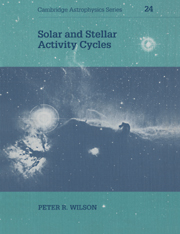Book contents
- Frontmatter
- Contents
- Preface
- Acknowledgments
- 1 Introduction
- 2 Historical survey
- 3 The structure of the Sun and the phenomena of activity
- 4 The equations of magnetohydrodynamics and magnetohydrostatics
- 5 The one-dimensional configuration of the cycle
- 6 Heuristic models of the solar activity cycle
- 7 Stellar activity and activity cycles
- 8 The two-dimensional representation of the extended activity cycle
- 9 The origin of the large-scale fields
- 10 The reversal of the polar magnetic fields
- 11 The role of dynamo theory in cyclic activity
- 12 Helioseismology and the solar cycle
- 13 Cyclic activity and chaos
- 14 Forecasting the solar cycle
- 15 Summary and conclusions
- Author index
- Subject index
13 - Cyclic activity and chaos
Published online by Cambridge University Press: 27 October 2009
- Frontmatter
- Contents
- Preface
- Acknowledgments
- 1 Introduction
- 2 Historical survey
- 3 The structure of the Sun and the phenomena of activity
- 4 The equations of magnetohydrodynamics and magnetohydrostatics
- 5 The one-dimensional configuration of the cycle
- 6 Heuristic models of the solar activity cycle
- 7 Stellar activity and activity cycles
- 8 The two-dimensional representation of the extended activity cycle
- 9 The origin of the large-scale fields
- 10 The reversal of the polar magnetic fields
- 11 The role of dynamo theory in cyclic activity
- 12 Helioseismology and the solar cycle
- 13 Cyclic activity and chaos
- 14 Forecasting the solar cycle
- 15 Summary and conclusions
- Author index
- Subject index
Summary
I believe that order is better than chaos, creation better than destruction, and, on the whole, I think that knowledge is preferable to ignorance
Kenneth Clark, CivilizationIntroduction
Recent work in the theory of non-linear dynamical systems has centred on the concept of chaos, a term that applies to a great variety of situations and configurations. This relatively new subject is fascinating in its own right, and the rapidly growing body of knowledge surrounding it has uncovered a number of characteristics shared by all chaotic systems. The concept has not only achieved an extensive currency throughout the mathematical and scientific communities but has also captured the interest of many in the nonmathematical world, the latter largely due to an excellent popular discussion of the history and basic ideas by James Gleick (1988)
If the dynamics of the solar magnetic field are due to magnetoconvective dynamo action within the Sun, then the activity cycle is governed by the non-linear equations of magnetohydrodynamics, discussed in Chapter 11. A number of investigators have suggested that solar and stellar activity cycles are chaotic phenomena and have begun to explore the implications of cyclic systems which are chaotic.
If stellar activity cycles are indeed examples of chaotic systems, then they will share in the universal characteristics of such systems. In order to discuss the implications for cyclic activity, a brief outline of the relevant concepts in the theory of chaos is called for.
- Type
- Chapter
- Information
- Solar and Stellar Activity Cycles , pp. 228 - 242Publisher: Cambridge University PressPrint publication year: 1994



